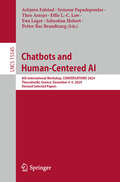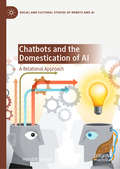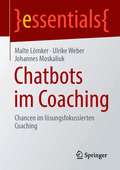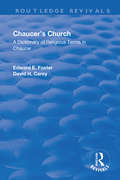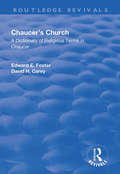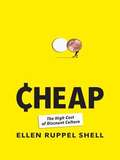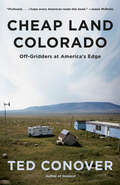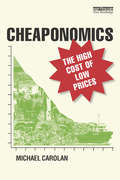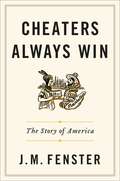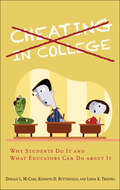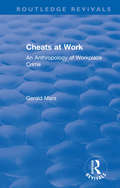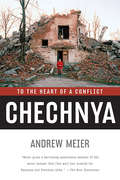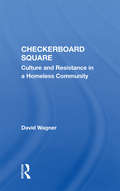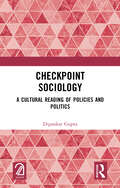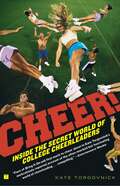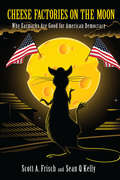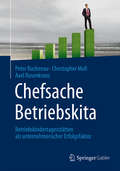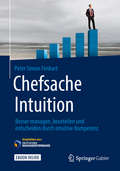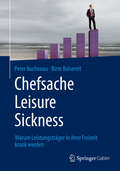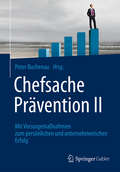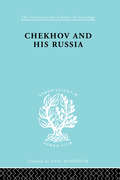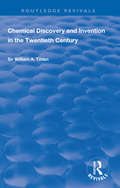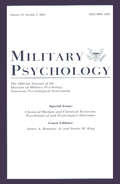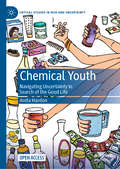- Table View
- List View
Chatbots and Human-Centered AI: 8th International Workshop, CONVERSATIONS 2024, Thessaloniki, Greece, December 4–5, 2024, Revised Selected Papers (Lecture Notes in Computer Science #15545)
by Symeon Papadopoulos Asbjørn Følstad Theo Araujo Ewa Luger Petter Bae Brandtzaeg Effie L.-C. Law Sebastian HobertThis book constitutes the refereed proceedings of the 8th International Workshop on Chatbots and Human-Centered AI, CONVERSATIONS 2024, held in Thessaloniki, Greece, during December 4–5, 2024. The 12 full papers and 3 short papers were carefully reviewed and selected from 35 submissions. They were organized in topical sections as follows: Understanding and Designing for Human-AI Interactions; Human-Centred AI in Education and Social Support; Conversational AI for Citizens and Customers.
Chatbots and the Domestication of AI: A Relational Approach (Social and Cultural Studies of Robots and AI)
by Hendrik KemptThis book explores some of the ethical, legal, and social implications of chatbots, or conversational artificial agents. It reviews the possibility of establishing meaningful social relationships with chatbots and investigates the consequences of those relationships for contemporary debates in the philosophy of Artificial Intelligence. The author introduces current technological challenges of AI and discusses how technological progress and social change influence our understanding of social relationships. He then argues that chatbots introduce epistemic uncertainty into human social discourse, but that this can be ameliorated by introducing a new ontological classification or 'status' for chatbots. This step forward would allow humans to reap the benefits of this technological development, without the attendant losses. Finally, the author considers the consequences of chatbots on human-human relationships, providing analysis on robot rights, human-centered design, and the social tension between robophobes and robophiles.
Chatbots im Coaching: Chancen im lösungs-fokussierten Coaching (essentials)
by Johannes Moskaliuk Ulrike Weber Malte LömkerDieses essential gibt einen fundierten Einblick in die Einsatzmöglichkeiten von Chatbots im lösungsfokussierten Coaching. Es zeigt die Einsatzmöglichkeiten von Chatbots auf, besonders die weniger bekannten im Gesundheitssektor, skizziert deren Möglichkeiten und Grenzen und diskutiert ihre Weiterentwicklung. Basierend auf wissenschaftlich bestätigten Erfolgsfaktoren für Coaching und dem Konzept des lösungsfokussierten Coachings erläutert das essential anschaulich die Umsetzung von Coaching-Prozessen in die „Denkweise und Sprache“ von Chatbots. Als Ausblick diskutiert das essential das Verhältnis Mensch zu Maschine, und wie Chatbots unser jetziges Verständnis von Coaching nachhaltig verändern und bereichern können.
Chaucer's Church: A Dictionary of Religious Terms in Chaucer
by Edward FosterThis title was first published in 2002: The purpose of "Chaucer's Church" is to provide clear, concise and reliable explanations of every term Chaucer uses that has a religious, liturgical, or ecclesiastical meaning. It uses a dictionary format, arranged according to Chaucer's spellings, to make information readily accessible for students, teachers, critics, and the general reader. The shorter entries present brief definitions which are more lively and illuminating than those in standard dictionaries or glossaries; the longer entries are in fact short essays, with suggestions for further reading, on broader or more complex topics. In all cases the entries concentrate on lucid and accurate presentation of the meanings that the terms had or could have had for Chaucer and a 14th-century audience. The book is a compact but precise reference for readers of all levels of experience on the vocabulary of fourteenth-century religion, which is often unfamiliar or only hazily understood. A careful system of cross-references guides the reader to related terms, so that individual entries can be further explored in related or larger contexts. The book may also be browsed or read on its own, for the entries taken together, especially the brief essays, provide a coherent introduction to the Christian world of the late fourteenth century. In Chaucer's Church, the editors have succeeded in compiling a volume that combines ease of use with readability and rigorous accuracy. This book provides convenient and trustworthy access to Chaucer's religious world.
Chaucer's Church: A Dictionary of Religious Terms in Chaucer (Routledge Revivals)
by Edward E FosterThis title was first published in 2002: The purpose of "Chaucer's Church" is to provide clear, concise and reliable explanations of every term Chaucer uses that has a religious, liturgical, or ecclesiastical meaning. It uses a dictionary format, arranged according to Chaucer's spellings, to make information readily accessible for students, teachers, critics, and the general reader. The shorter entries present brief definitions which are more lively and illuminating than those in standard dictionaries or glossaries; the longer entries are in fact short essays, with suggestions for further reading, on broader or more complex topics. In all cases the entries concentrate on lucid and accurate presentation of the meanings that the terms had or could have had for Chaucer and a 14th-century audience. The book is a compact but precise reference for readers of all levels of experience on the vocabulary of fourteenth-century religion, which is often unfamiliar or only hazily understood.
Cheap
by Ellen Ruppel ShellAn Atlantic correspondent uncovers the true cost-in economic, political, and psychic terms-of our penchant for making and buying things as cheaply as possible. From the shuttered factories of the rust belt to the look-alike strip malls of the sun belt-and almost everywhere in between-America has been transformed by its relentless fixation on low price. This pervasive yet little examined obsession is arguably the most powerful and devastating market force of our time-the engine of globalization, outsourcing, planned obsolescence, and economic instability in an increasingly unsettled world. Low price is so alluring that we may have forgotten how thoroughly we once distrusted it. Ellen Ruppel Shell traces the birth of the bargain as we know it from the Industrial Revolution to the assembly line and beyond, homing in on a number of colorful characters, such as Gene Verkauf (his name is Yiddish for 'to sell'), founder of E. J. Korvette, the discount chain that helped wean customers off traditional notions of value. The rise of the chain store in post-Depression America led to the extolling of convenience over quality, and big-box retailers completed the reeducation of the American consumer by making them prize low price in the way they once prized durability and craftsmanship. The effects of this insidious perceptual shift are vast: a blighted landscape, escalating debt (both personal and national), stagnating incomes, fraying communities, and a host of other socioeconomic ills. That's a long list of charges, and it runs counter to orthodox economics which argues that low price powers productivity by stimulating a brisk free market. But Shell marshals evidence from a wide range of fields-history, sociology, marketing, psychology, even economics itself-to upend the conventional wisdom. Cheap also unveils the fascinating and unsettling illogic that underpins our bargain-hunting reflex and explains how our deep-rooted need for bargains colors every aspect of our psyches and social lives. In this myth-shattering, closely reasoned, and exhaustively reported investigation, Shell exposes the astronomically high cost of cheap.
Cheap Land Colorado: Off-Gridders at America's Edge
by Ted ConoverFrom Pulitzer Prize finalist and National Book Critics Circle Award–winning author of Newjack, a passage through an America lived wild and off the grid, where along with independence and stunning views come fierce winds, neighbors with criminal pasts, and minimal government and medical services.&“In these dispatches, [Conover] invites readers to ride shotgun along an unraveling edge of the American West, where sepia-toned myths about making a fresh start collide with modern modes of alienation, volatility, and exile.... In a nation whose edges have come to define its center, this is essential reading.&”—Jessica Bruder, author of Nomadland: Surviving America in the Twenty-First Century In May 2017, Ted Conover went to Colorado to explore firsthand a rural way of life that is about living cheaply, on your own land—and keeping clear of the mainstream. The failed subdivisions of the enormous San Luis Valley make this possible. Five-acre lots on the high prairie can be had for five thousand dollars, sometimes less. Conover volunteered for a local group trying to prevent homelessness during the bitter winters. He encountered an unexpected diversity: veterans with PTSD, families homeschooling, addicts young and old, gay people, people of color, lovers of guns and marijuana, people with social anxiety—most of them spurning charity and aiming, and sometimes failing, to be self-sufficient. And more than a few predicting they&’ll be the last ones standing when society collapses.Conover bought his own five acres and immersed himself for parts of four years in the often contentious culture of the far margins. He found many who dislike the government but depend on its subsidies; who love their space but nevertheless find themselves in each other&’s business; who are generous but wary of thieves; who endure squalor but appreciate beauty. In their struggles to survive and get along, they tell us about an America riven by difference where the edges speak more and more loudly to the mainstream.
Cheaponomics: The High Cost of Low Prices
by Michael CarolanDo you really think you are getting a good deal when given that free mobile phone for switching service providers, if a multinational retailer undercuts its competitors or by the fact that food is relatively cheaper today in many countries than ever before? Think again! As Michael Carolan clearly shows in this compelling book, cheapness is an illusion. The real cost of low prices is alarmingly high. It is shown for example that citizens are frequently subsidising low prices through welfare support to poorly-paid workers in their own country, or relying on the exploitation of workers in poor countries for cheap goods. Environmental pollution may not be costed into goods and services, but is paid for indirectly by people living away from its source or by future generations. Even with private cars, when the total costs of this form of mobility are tallied it proves to be an astronomically expensive model of transportation. All of these costs need to be accounted for. The author captures these issues by the concept of "cheaponomics". The key point is that costs and risks are socialised: we all pay for cheapness, but not at the point of purchase. Drawing on a wide range of examples and issues from over-consumption and waste to over-work, unemployment, inequality, and the depersonalising of communities, it is convincingly shown that cheapness can no longer be seen as such a bargain. Instead we need to refocus for a better sense of well-being, social justice and a balanced approach to prosperity.
Cheaters Always Win: The Story of America
by J. M. FensterA social history of cheating and how American history -- through real estate, sports, finance, academics, and of course politics -- has had its unfair share of rigged results and widened the margins on its gray areas.Drawing from the intriguing (and sometimes unbelievable) true stories of the lives of everyday Americans, historian Julie M. Fenster traces the history of the weakening of our national ethics through the practice of cheating. From marital infidelity to financial fraud; rigged sports competitions to corruption in politics and the American education system; nuclear weaponry to beauty pageants; hospitals, TV gameshows, and charities; nothing and no one is exempt. And far from being ostracized, cheaters in every sphere continue to survive and even thrive, casting their influence over the rest of our society. And nowhere is this more obvious than in the recent tectonic shift in politics, where a revolution in our collective attitude toward fraudsters has ushered in a new kind of leadership. Part history of an all-American tradition, part dissection of an ongoing national crisis, Cheaters Always Win is irresistible reading -- a smart, sardonic, and scintillating look into the practice that made America what it is today.
Cheating in College: Why Students Do It and What Educators Can Do about It
by Donald L. McCabe Kenneth D. Butterfield Linda K. TreviñoWith academic dishonesty on the rise, this book explains why students cheat, how to foster integrity, and why it matters.Today’s students are tomorrow’s leaders, and the college years are a critical period for their development of ethical standards. Cheating in College explores how and why students cheat and what policies, practices, and participation may be useful in promoting academic integrity and reducing cheating.The authors investigate trends over time, including internet-based cheating. They consider personal and situational explanations, such as the culture of groups in which dishonesty is more common (such as business majors) and social settings that support cheating (such as fraternities and sororities). They also focus on how faculty and administrators are increasing their efforts to promote academic honesty among students. Orientation and training sessions, information on college and university websites, student handbooks that describe codes of conduct, honor codes, and course syllabi all define cheating and establish the consequences.Based on the authors’ multiyear, multisite surveys, Cheating in College quantifies and analyzes student cheating to demonstrate why academic integrity is important and to describe the cultural efforts that are effective in restoring it.
Cheats at Work: An Anthropology of Workplace Crime (Routledge Revivals)
by Gerald MarsOriginally published in 1982 Cheats at Work looks at occupations from an anthropological point of view, using a similar format to analysis of cultures in the study of anthropology. The author uses an extensive set of quotations drawn from over a hundred informants at all social levels. The interviews reveal a distinct set of ideologies and attitudes from various occupations. The book looks specifically at cheating, lying and deception in various occupations, and the interviews reveal how and why people cheat, and deceive their customers and clients, how they learn the concealed tricks and professions and how they justify this.
Chechnya: To the Heart of a Conflict
by Andrew MeierAndrew's Meier riveting portrait of Chechnya, a land ravaged by indescribable carnage, enables us to understand the origins of this brutal conflict like no other recent work. The barbaric, terrorist siege in the summer of 2004 that resulted in the deaths of hundreds of innocent children in Beslan did not begin either there or in the take-over of a Moscow theatre in 2002. As Andrew Meier explains in this utterly compelling account, the most recent Chechen war actually broke out on New Year's Eve in 1994 when Boris Yeltsin sent hundreds of tanks to the center of the city of Grozny in an effort to quell popular demands for independence from Russia. Six years later, Meier, braving great personal danger, traveled to the scene of one of the largest civilian massacres carried out by Russian troops, reporting on the carnage in which over 60 Chechen civiliansincluding a pregnant woman and many elderlywere brutally slaughtered in one of the war's most horrific "mop-up" operations. Days after a Chechen woman became the conflict's first female suicide bomber, Meier visited this war-torn province, encountering, among others, kidnappers, Wahhabi Islamists aligned with the Taliban, and a stream of Russian mothers arriving at the morgue to identify their fallen soldier sons. Chechnya is Meier's stunning report from a region where the death toll has already exceeded 100,000 people, and a book that attempts to comprehend what compels men to shoot children in the back.
Checkerboard Square: Culture And Resistance In A Homeless Community
by David WagnerDuring the past decade, homelessness became a widespread phenomenon in the United States for the first time since the Great Depression. The public frequently blamed the poor for their plight. Journalistic and academic accounts, in contrast, often evoked pathos and pity, regarding the homeless primarily as objects of treatment and rehabilitation. David Wagner challenges both of these dominant images, offering an ethnographic portrait of the poor that reveals their struggle not only to survive but also to create communities on the streets and to develop social movements on their own behalf. Definitely not passive victims, the homeless of Checkerboard Square survive within an alternative street culture, with its own norms and social organization, in a world often hidden from the view of researchers, journalists, and social workers. Checkerboard Square reveals the daily struggle of street people to organize their lives in the face of rejection by employers, government, landlords, and even their own families. Looking beyond the well-documented causes of homelessness such as lack of affordable housing or unemployment, Wagner shows how the poor often become homeless through resistance to the discipline of the workplace, authoritarian families, and the bureaucratic social welfare system. He explains why the crisis of homelessness is not only about the lack of services, housing, and jobs but a result of the very structure of the dominant institutions of work, family, and public social welfare.
Checkpoint Sociology: A Cultural Reading of Policies and Politics
by Dipankar GuptaRelying on many years of fieldwork and on his involvement with several national level policy making bodies, this book presents a cultural interpretation of how public life and state interventions in India should be viewed. While commending statistical interventions in governmental decision making, it detects a marked deficiency in the understanding of how cultural factors impress upon and condition economic life. Towards this end, Dipankar Gupta interrogates anti-poverty drives, labour relations, election studies and, in this process, provides a novel and helpful guide towards resolving the vexing relationship between the domains of the public and the private. In all of this, the sociological antenna is constantly at work, beeping helpful signals on how one might untangle knotty issues in public life. More than anything else, this book urges policy makers to be self-consciously intersubjective in their approach and this is where sociology can make its mark. The Appendix provides a medley of situations where cultural sensitivity and the discipline of sociology prove their worth in figuring out fresh ways to resolve outstanding problems in our country. This book is co-published with Aakar Books. Print edition not for sale in South Asia (India, Sri Lanka, Nepal, Bangladesh, Pakistan and Bhutan)
Cheer! Inside the Secret World of College Cheerleaders: Inside the Secret World of College Cheerleaders
by Kate TorgovnickThink cheerleading is just pom-poms, "gimme an 'R,'" and pleated skirts? Not anymore. Take an exhilarating trip through the rough-and-tumble world of competitive college cheerleading... College cheerleaders are extreme athletes who fly thirty feet in the air, build pyramids in which a single slip can send ten people crashing to the ground, and compete in National Championships that are won by hundredths of a point. Cheer!is a year-long odyssey into their universe, following three squads from tryouts to Nationals. Meet the Stephen F. Austin Lumberjack cheerleaders from Nacogdoches, Texas, who seem destined to win their fifth National Championship in a row -- until they are shaken by the departure of their longtime coach. Fall in love with the Southern University Jaguars from Baton Rouge, Louisiana, an African-American team hoping to raise the $17,000 needed to travel to Nationals and transform their near win several years ago into a Cinderella victory. Root for the University of Memphis All-Girl cheerleaders from Tennessee -- a team that continually struggles for the same respect Coed teams get -- when their quest for a national title is threatened by injuries and dropouts. Along the way, meet unforgettable characters like Sierra, a cheerleading prodigy who has never lost a competition; Doug, who is in his eighth year as a college cheerleader; and Casi, one of the few female bases who can lift another cheerleader on her own. These are people who risk horrifying injuries on a daily basis, battle demons like eating disorders and steroid use, and form intense bonds. In the immersive tradition of Friday Night Lights, Cheer! is a captivating, all-access journey into a deeply absorbing world.
Cheese Factories on the Moon: Why Earmarks are Good for American Democracy
by Scott A. Frisch Sean Q. KellyIt has become part of US political convention to attack 'earmarks' - legislative provisions that direct funds to specific projects - as wasteful and corrupt. In this provocative book Scott A. Frisch and Sean Q. Kelly argue that in fact earmarks are good for American democracy. Using extensive interviews with Washington insiders and detailed examples they illustrate how earmark projects that were pilloried in fact responded to the legitimate needs of local communities, needs that would otherwise have gone unmet. They also demonstrate that media coverage of earmarks tends to be superficial and overly-dramatic. Cheese Factories on the Moon is a much-needed challenge to a widespread but deeply flawed 'consensus' about what is wrong with US congressional spending.
Chefsache Betriebskita: Betriebskindertagesstätten als unternehmerischer Erfolgsfaktor
by Peter Buchenau Christopher Moll Axel RosenkranzKürzere Elternzeiten, sinkende Personalbeschaffungs- und Wiedereingliederungskosten, eine stärkere Identifikation und Bindung der Mitarbeiter an das Unternehmen sowie ein Imagegewinn sind nur einige der positiven Effekte von Betriebskitas. Die Betriebskita wird zum wichtigen Erfolgsfaktor und somit zur Chefsache. Die Autoren erläutern von der Ersteinschätzung und Machbarkeit über die Bedarfsermittlung bis hin zur ausführlichen Kosten-, Finanzierungs- und Personalplanung alles, was man zu diesem Thema wissen muss. Sie sprechen hierbei auch pädagogische Konzepte an und erläutern Beispiele zur Kosten-Nutzen-Abschätzung. Abschließend beinhaltet das Buch Erfahrungsberichte aus realisierten Betriebskitas sowie eine Zusammenstellung wichtiger Kontaktadressen und Informationsquellen.
Chefsache Intuition: Besser managen, beurteilen und entscheiden durch intuitive Kompetenz (Chefsache Ser.)
by Peter Buchenau Peter Simon FenkartDas Buch aus der Chefsache-Reihe stellt die Intuition als wichtiges Erfolgskriterium für Entscheidungen und Zieldefinitionen in Unternehmen in den Blickpunkt. Intuition ist die Fähigkeit, komplexe Sachverhalte umfassend zu durchdringen, kritische Faktoren zu erkennen und gedankliche Grenzen zu überwinden. Der Verstand lässt sich durch Glaubenssätze und Neigungen fehlleiten und unterdrückt damit die intuitiven Fähigkeiten. Der Autor zeigt, dass das Trainieren der Intuition die Entscheidungskompetenz stärkt, die Kreativität und Lösungskompetenz fördert, sowie die Fähigkeit ausbaut, mit Menschen umzugehen.
Chefsache Leisure Sickness: Warum Leistungsträger in ihrer Freizeit krank werden
by Peter Buchenau Birte BalsereitDas Leisure-Sickness-Syndrom, auch ,,Freizeitkrankheit" genannt, betrifft mittlerweile einen großen Anteil der berufstätigen Menschen. Wer viel und konzentriert arbeitet, benötigt dringend Erholung. Aber das scheint unmöglich, wenn man ausgerechnet am Wochenende oder im Urlaub erkrankt. Peter Buchenau und Birte Balsereit zeigen auf, was Führungskräfte und Leistungsträger tun können, um sich in den Erholungsphasen wirksam entspannen und regenerieren zu können. Dadurch, dass die Batterien des Einzelnen wieder aufgeladen werden, können sowohl die Leistungsfähigkeit und Produktivität im Unternehmen als auch die persönliche Lebensqualität wirkungsvoll gesteigert werden. Konkrete Anleitungen, Checklisten, Grafiken, Illustrationen, direkt anwendbare Übungen und Praxisbeispiele garantieren dem Leser unmittelbare Umsetzungsmöglichkeiten. Ein Muss für jede Führungskraft!
Chefsache Prävention I: Mit Vorsorgemaßnahmen zum persönlichen und unternehmerischen Erfolg
by Peter BuchenauVerantwortungsvolles Handeln im und mit dem eigenen Unternehmen bedeutet, auch Prävention zur Chefsache zu machen. Prävention ist hier nicht nur als Mittel zur Gewinnmaximierung zu verstehen, sondern nimmt das Wohlergehen eines Unternehmens als ein von Menschen bewegtes, lebendiges System in den Blick. 15 Unternehmensberater, Trainer und Coaches stellen ihre ganz persönlichen Erfolgsrezepte zum Thema Prävention vor und zwar bezogen auf ihr jeweiliges Spezialgebiet. Die Autoren zeigen, was alles zu berücksichtigen ist und warum Prävention für alle Unternehmen zwingend notwendig ist - von der Ersteinschätzung und Machbarkeit über die Bedarfsermittlung bis hin zur ausführlichen Kosten-, Finanzierungs- und Personalplanung. Dabei geht es nicht nur um Gesundheitsprävention, sondern das Konzept der Prävention wird auch auf Betriebswirtschaft, Steuern, Prozesse und Führung angewendet. Die Gliederung in die drei großen Themenblöcke - Kommunikation und Beziehung, elementare Unternehmensstrukturen und Strategien sowie Geist und Körper - macht das Buch zu einem Nachschlagewerk zu aktuellen Fragen, zu denen Sie gerade jetzt eine Lösung suchen.
Chekhov & His Russia Ils 267 (International Library of Sociology)
by W.H. BrufordFirst Published in 1998. Routledge is an imprint of Taylor & Francis, an informa company.
Chemical Discovery and Invention in the Twentieth Century (Routledge Revivals)
by Wiliam A. TildenFirst published in 1919. Tilden discusses a compilation of chemical discovery and invention to demonstrate the progress of chemistry in the early 20th century. Divided into 5 sections, chemical laboratories and the work done in them, modern discoveries and theories, modern applications of chemistry, and modern progress in organic chemistry, the author presents an overview of the subject. The final section of the book contains an account of important discoveries which find practical applications and provide new views of the constitution of the world in which we live.
Chemical Warfare and Chemical Terrorism: Psychological and Performance Outcomes:a Special Issue of military Psychology
by James A. Romano James M. KingThis special issue of Military Psychology reports behavioral, pharmacological, and toxicological science research on military performance as it is affected by chemical warfare agents (CWAs) and their pharmacological countermeasures. The papers in this issue are a diverse assembly; some very pharmacological in orientation, others driven by behavioral neuroscience. The unifying theme is the psychological consequences or organic syndromes that may be confused with consequences resulting from exposure to CWAs or use of their medical countermeasures.
Chemical Youth: Navigating Uncertainty in Search of the Good Life (Critical Studies in Risk and Uncertainty)
by Anita HardonThis open access book explores how young people engage with chemical substances in their everyday lives. It builds upon and supplements a large body of literature on young people’s use of drugs and alcohol to highlight the subjectivities and socialities that chemical use enables across diverse socio-cultural settings, illustrating how young people seek to avoid harm, while harnessing the beneficial effects of chemical use. The book is based on multi-sited anthropological research in Southeast Asia, Europe and the US, and presents insights from collaborative and contrasting analysis. Hardon brings new perspectives to debates across drug policy studies, pharmaceutical cultures and regulation, science and technology studies, and youth and precarity in post-industrial societies.
Chemically Imbalanced: Everyday Suffering, Medication, and Our Troubled Quest for Self-Mastery
by Joseph E. DavisA study of how ordinary people deal with everyday problems through self-mastery and mental health care practices.Everyday suffering—those conditions or feelings brought on by trying circumstances that arise in everyone’s lives—is something that humans have grappled with for millennia. But the last decades have seen a drastic change in the way we approach it. In the past, a person going through a time of difficulty might keep a journal or see a therapist, but now the psychological has been replaced by the biological: instead of treating the heart, soul, and mind, we take a pill to treat the brain.Chemically Imbalanced is a field report on how ordinary people dealing with common problems explain their suffering, how they’re increasingly turning to the thin and mechanistic language of the “body/brain,” and what these encounters might tell us. Drawing on interviews with people dealing with struggles such as underperformance in school or work, grief after the end of a relationship, or disappointment with how their life is unfolding, Joseph E. Davis reveals the profound revolution in consciousness that is underway. We now see suffering as an imbalance in the brain that needs to be fixed, usually through chemical means. This has rippled into our social and cultural conversations, and it has affected how we, as a society, imagine ourselves and envision what constitutes a good life. Davis warns that what we envision as a neurological revolution, in which suffering is a mechanistic problem, has troubling and entrapping consequences. And he makes the case that by turning away from an interpretive, meaning-making view of ourselves, we thwart our chances to enrich our souls and learn important truths about ourselves and the social conditions under which we live.Praise for Chemically Imbalanced“Chemically Imbalanced is an excellent addition to the works in social sciences and humanities that examine the distress of ordinary Americans from the second half of the twentieth century onward, a period when commercialized pills and the psychology-based notion of self-improvement entered the minds of Americans.” —Metascience“Chemically Imbalanced raises important questions, offers new insight into the power and reach of the biomedical model and neurobiological thinking, and I highly recommend it. I encourage readers to assign it, especially in graduate-level mental health and illness classes—or any class looking for a discussion on people’s experiences with suffering and the broad impacts of biomedical thinking and treatment.” —Social Forces
